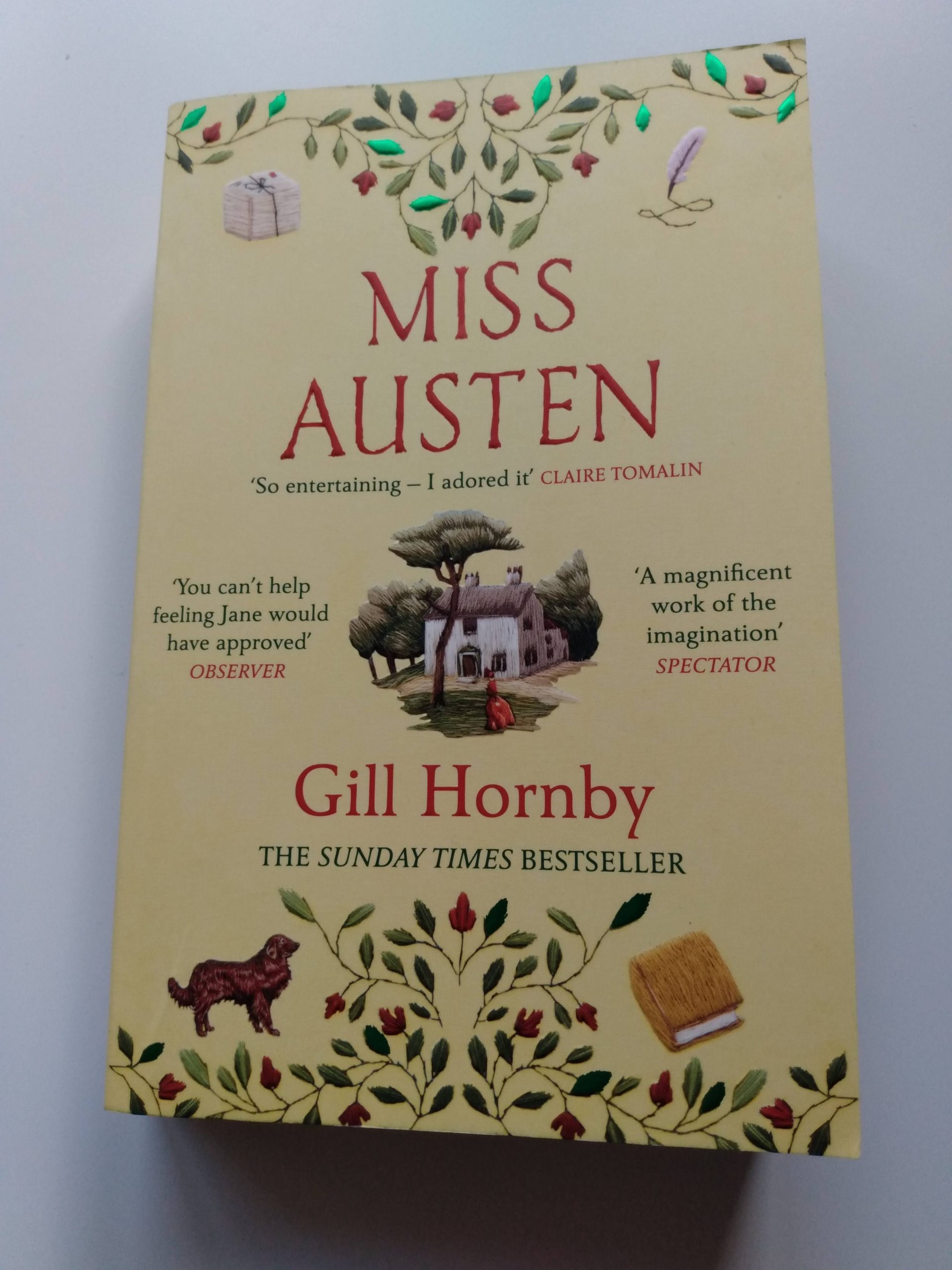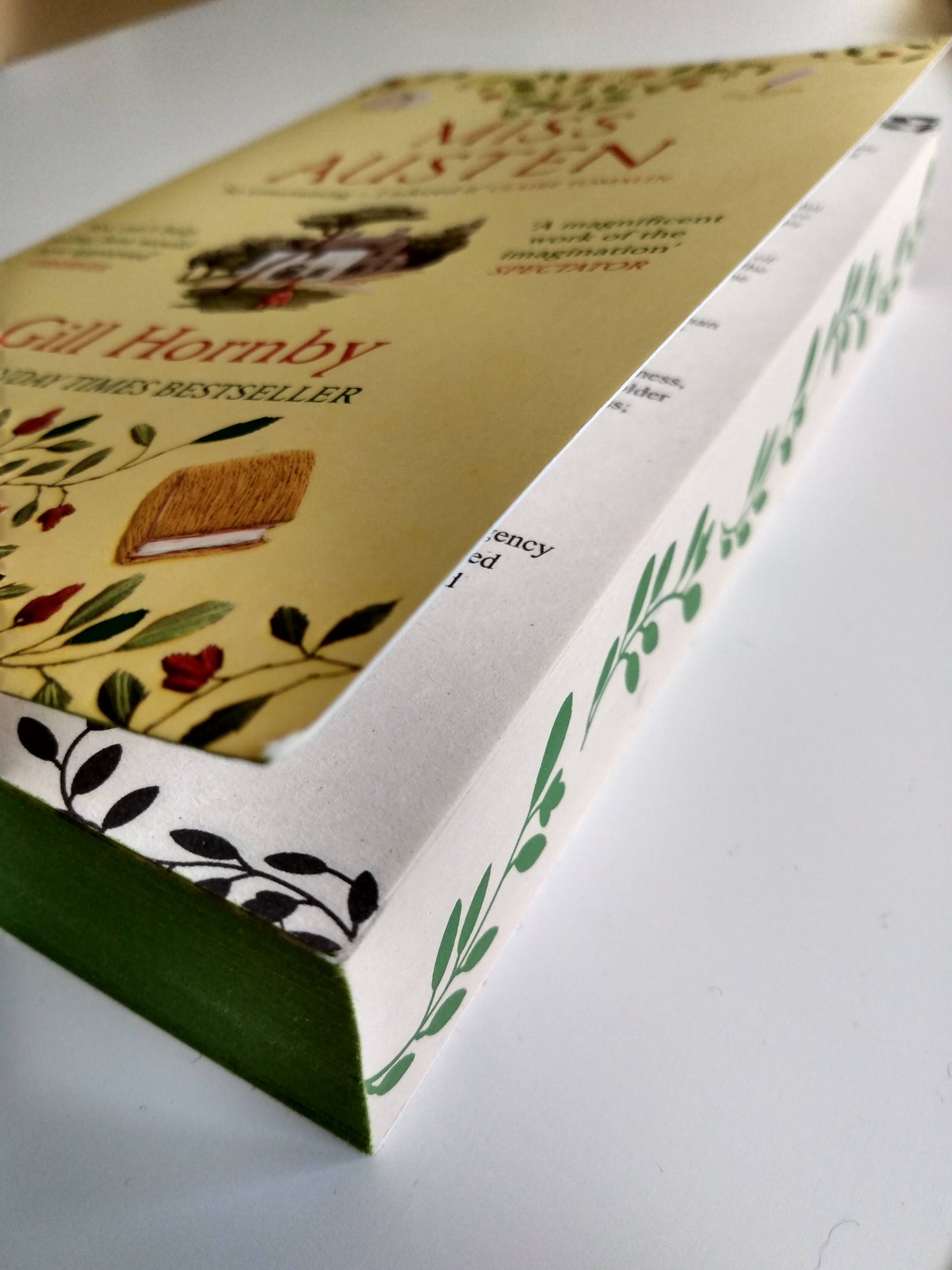Miss Austen, by Gill Hornby
The book with the prettiest pages! I've had to include two photographs on this post - because I can't not give credit to the appearance of this book. The way the green leaves on the page-ends match the cover design is very aesthetically pleasing.
The book itself is based on 'a literary mystery that has long puzzled Jane Austen fans.' I confess, I did have to do a bit of preliminary Googling, to clarify exactly what this literary mystery was. I do like Jane Austen, but perhaps I am a fake fan...


Jane Austen wrote a large number of letters in her lifetime, and some years after Jane's death, her sister Cassandra burnt them all. This novel is an imagining of why Cassandra Austen might have burnt the letters.
I will say now that this was not the most riveting book I have ever read. I was a tad disappointed (especially as the cover had been so enticing) but I trudged through regardless, in the hope that it might pick up a bit. It didn't really, but there were some interesting elements nevertheless.
In some ways it was a nice pastiche of Jane Austen's style. The narrative voice sounded very Austen-esque, with the same sorts of long sentences and additional subordinate clauses so typical of the period. Of course it was also set in a very similar environment to that of Austen's novels, with lots of big families meeting for dinner in their country estates and that sort of thing.
Similarly to Austen, there was more of a focus on character than any page-turning plot, but unfortunately I felt that the characters were left a little undeveloped. What Austen does really well is she makes her cast nuanced and believable and lovable, and she also uses their characteristics to drive the plot along (see my post on Northanger Abbey). Although Hornby's cast did have their own personalities, they didn't particularly change or develop throughout the novel - characterisation could have been used more effectively.
Of course I do understand that Hornby had some limitations: she didn't create these characters, because they were real people. I feel as though Hornby was very faithful to reality and believability, perhaps such that her artistic licence took a bit of a blow.
Another example of reality being annoying was the characters' names. There were a couple of Marys, at least one Jane and even a Mary-Jane. Cassandra herself was also sometimes known as Cassy, but although Cassandra and Cassy were one and the same, Elizabeth and Eliza were not. In spite of the cast list helpfully provided at the front of the book, I did find this rather confusing. I can only imagine how confusing it must have been for these poor ladies in real life, all to have been sharing a fairly limited pool of names!
One thing I liked about this novel was the changing between present and past. Much of it was set in 1840, with Cassandra an elderly woman. In this narrative she divided her time between making a nuisance of herself at the vicarage in Kintbury, and reading Jane's letters. Whenever she read a letter, the actual text of the letter was printed. And after that, the narrative would slip seamlessly into the past, to whatever situations surrounded the writing of that particular letter. This worked really well, because it was almost as though we were inside Cassandra's mind. For her, reading each letter brought to life a wealth of memories and took her back to a very specific moment in her own past. As readers, we were able to experience this with her.
The content of the letters, though, was underwhelming. The book's blurb, misleadingly, promised 'secrets which should not be revealed.' Alas, my 21st Century idea of scandal and outrage is not quite in line with what the Austens would have considered - did consider - to be scandal and outrage. The letters were really quite tame, and the most scandalous thing about them really was their impropriety in the eyes of society. (They were too confiding, and suggested shameful things like having a passing crush on an unsuitable gentleman.)
It was at this point whilst reading the book that I stopped looking for a gripping plotline, and realised that I would enjoy it more if I appreciated it as a social commentary. In truth, these women's entire lives were defined by their position in society. The idea of women being secondary to men arose quite clearly in 'Miss Austen'; Cassandra and Jane were severely disadvantaged as unmarried females. They were totally reliant on men for their income (Jane's writing career hadn't taken off at this point and was still considered highly unconventional), for a roof over their heads, and for respect - their lives weren't seen as complete or fulfilled until they had married, and married well. Therefore when the men of the family died, the women were impacted terribly. So much of this book revolved around these ideas. Propriety, duty, reputation. Cassandra even went as far as burning the letters to preserve decorum.
Finally, something this book got dead right. It is hardly surprising that the characters read all the time (they were the family of Jane Austen!), but the way Hornby had them gather together, whole families in the drawing room, or sisters in their room late at night, purely to read, was very heart-warming. Their infectious enjoyment of reading, fuelled of course by Jane's talent for writing, filled me with joy. Books were what got these people through their hard times, what united them and what delighted them. I liked that.
